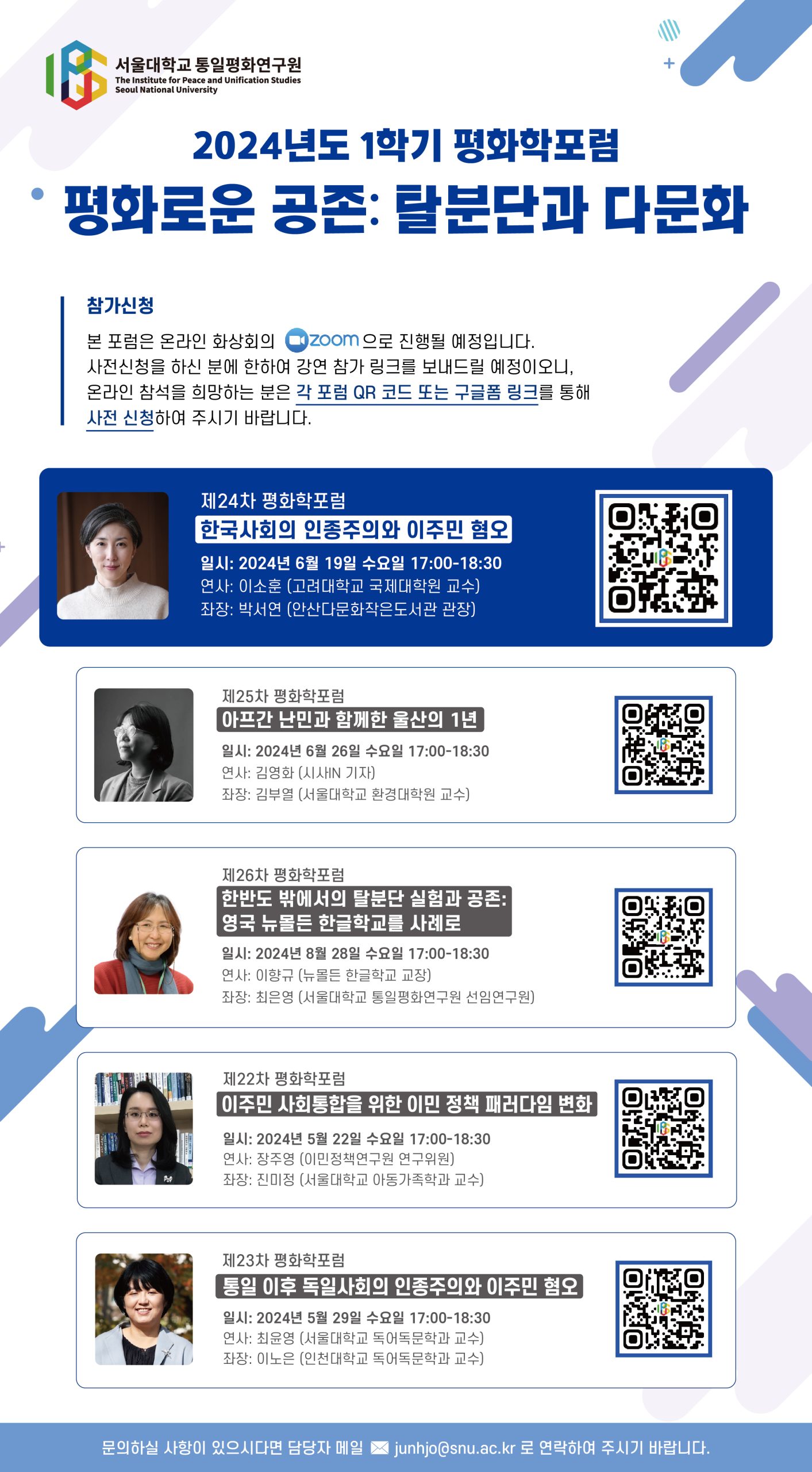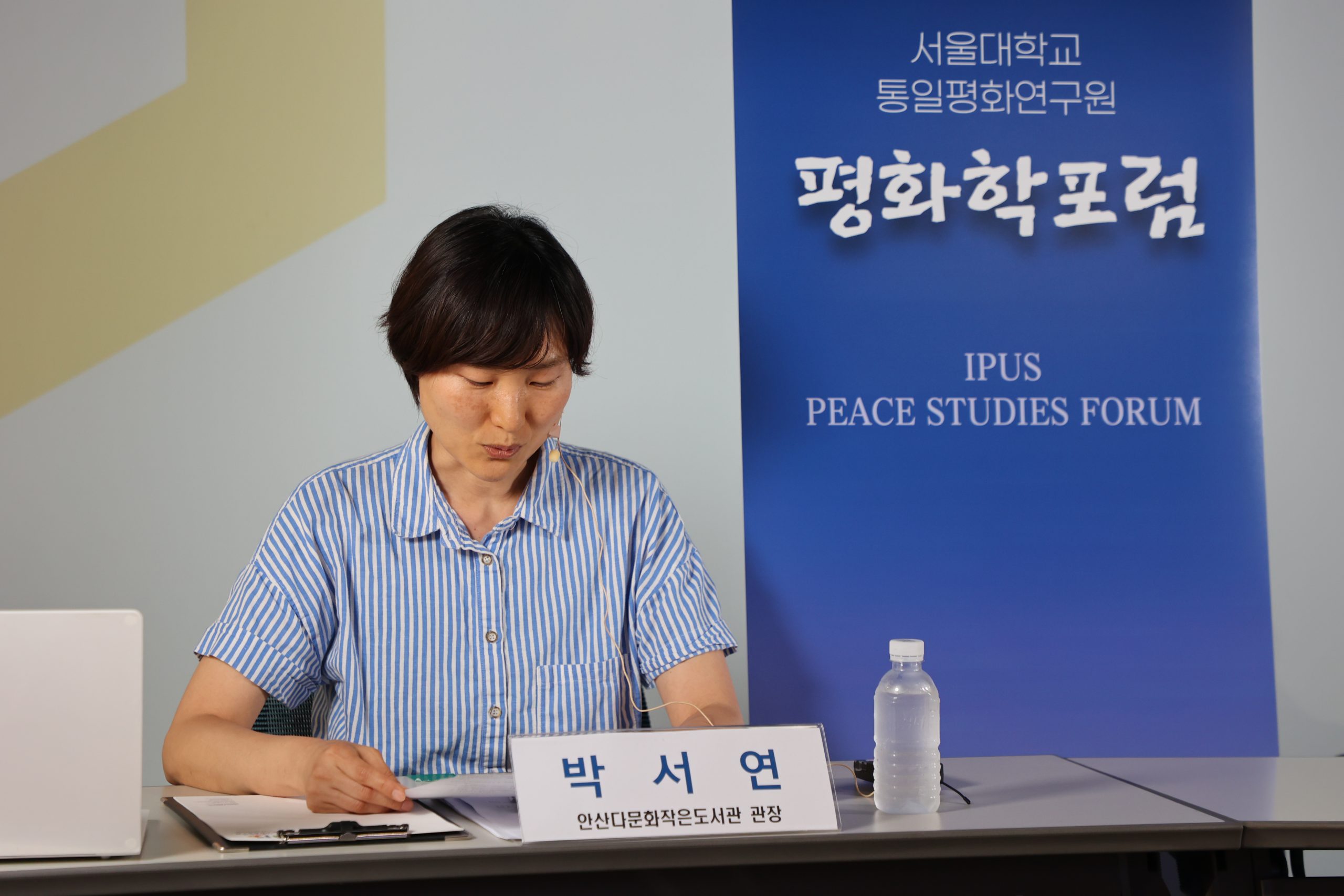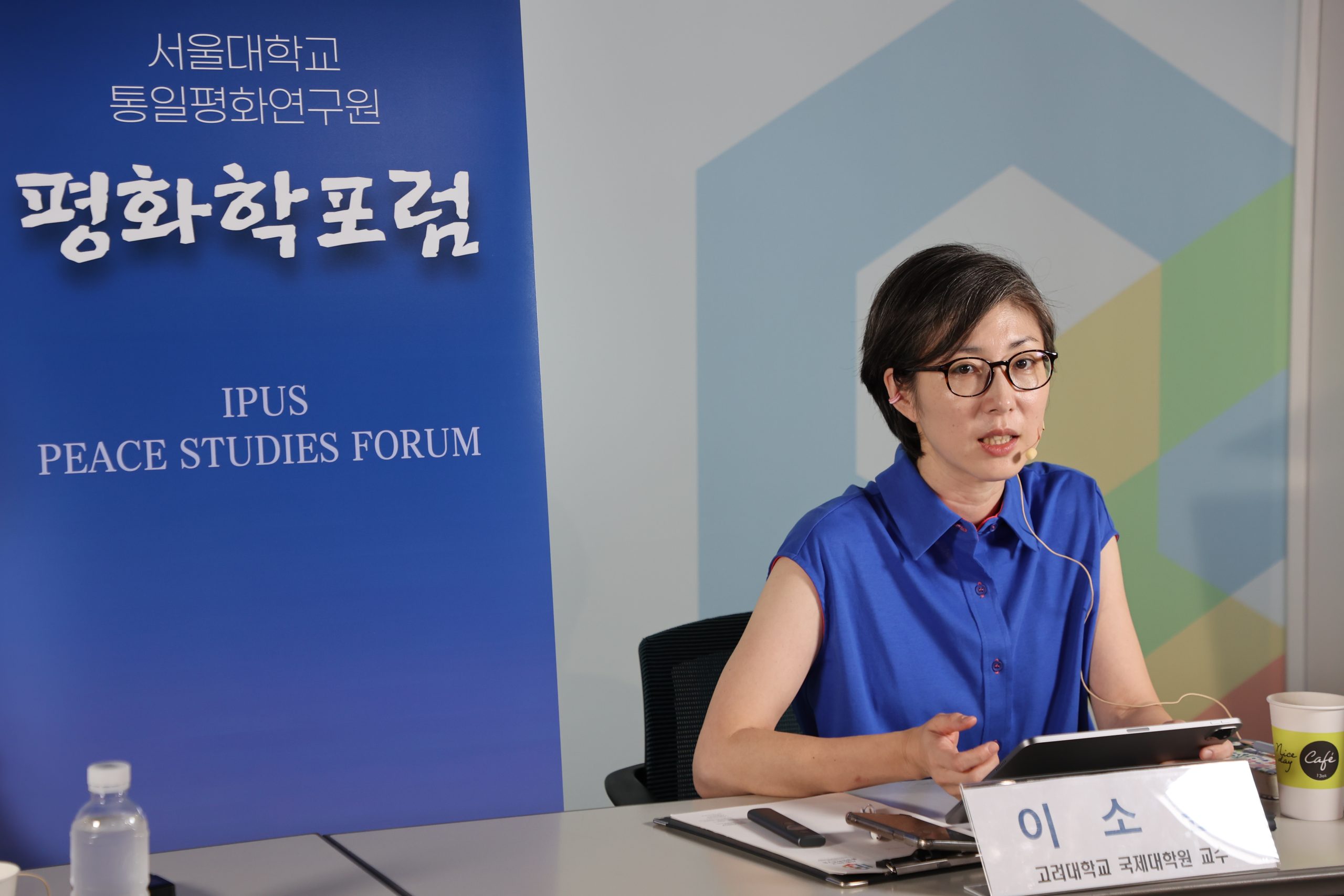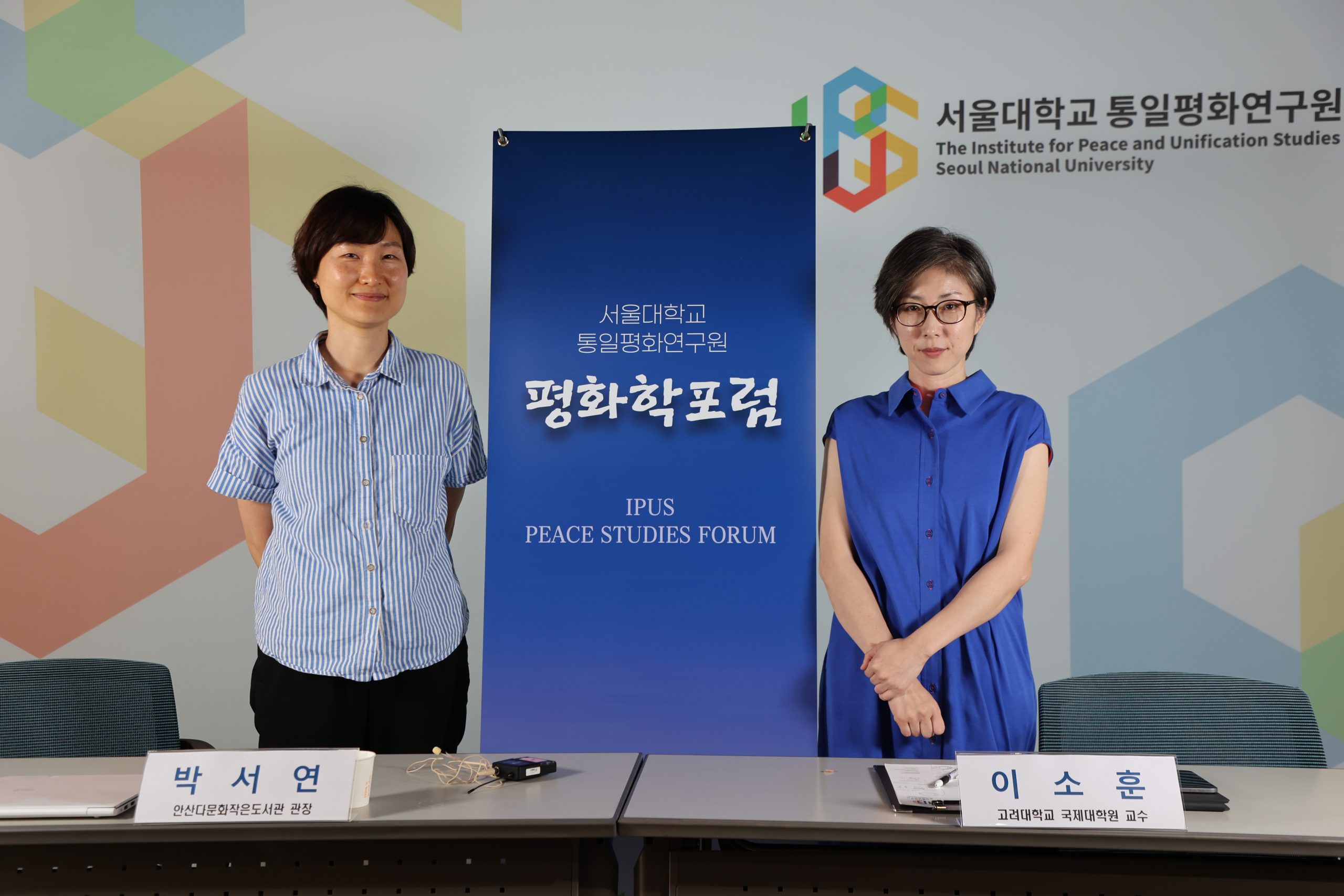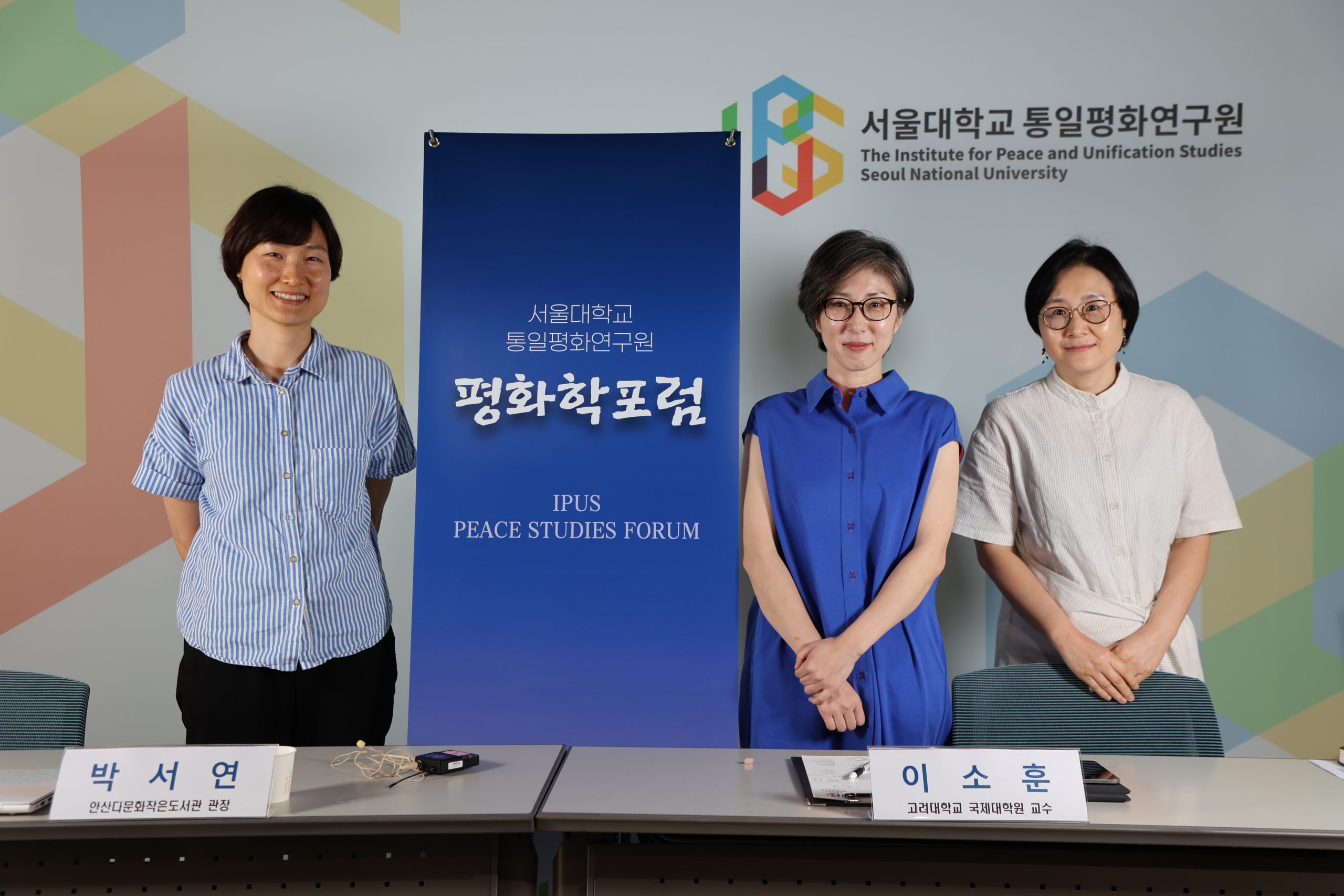[24th Peace Studies Forum] Racism and Xenophobia in Korean Society
- Date: Wednesday, June 19, 2024, 17:00-18:30
- Venue: Online Video Conference (ZOOM)
- Presenter: Yi, Sohoon (Professor, Graduate School of International Studies at Korea University)
- Chair: Park, Seo Yeon (Director, Ansan Multicultural Small Library)
- Theme: Racism and Xenophobia in Korean Society
The Institute for Peace and Unification Studies at Seoul National University (IPUS at SNU) held the 24th Peace Studies Forum on Wednesday, June 19, 2024, under the overarching theme of ‘Peaceful Coexistence: Post-Division and Multiculturalism.’ The forum featured a discussion led by Professor Yi, Sohoon from the Graduate School of International Studies at Korea University under the main topic ‘Racism and Xenophobia in Korean Society.’ Park, Seo Yeon, Director of Ansan Multicultural Small Library, chaired the forum, opening the event with welcoming remarks.
In this forum, Professor Yi examined the situation in the last century, when the concept of race first emerged, from a comparative perspective with the present, in order to consider the misconceptions and preconceptions we have about race. First, she presented three theses: “Race is a constructed concept, and historically, white supremacy has served to justify European imperialism and colonialism, and the concept of race has influenced the formation of modernity and modernization.” Second, Prof. Yi argued that “historically, the formation of ‘Koreanness’ has been accompanied by racial processes, but due to unique historical processes, racial hierarchies have been obscured, contradicted, and developed with compromised logics.” Finally, Professor Yi emphasized that “we need to examine how to understand the historically shaped concept of racism and how new forms of racism are unfolding in Korean society, which has entered the ranks of high-income countries in the 21st century.”
Professor Yi first attempted a conceptual approach to race based on the concept defined by Aníbal Quijano, describing it as “a socio-historically constructed concept that justifies power structures and domination relationships such as colonialism based on beliefs about biological differences as ‘natural superiority/ inferiority.’” Citing the work of Omi & Winant (2014), Yi explained that “racial identity is created and experienced through a series of historical and social processes, and as such, it is not a fixed stereotype, but is (re)defined, transformed, disrupted, and contested.” Introducing the work of Keevak (2011), she explained that “the ‘Mongoloid race’ was created by the rise of medical discourse in the 19th century, which led to the study of the ‘biological defects’ of Mongoloids in comparison to the physical characteristics of Caucasians in order to create a ‘scientific’ distinction between Caucasians and people of color.” In particular, Professor Yi described the historical flow of racism against yellow people, beginning in the late 1800s with the introduction of the ‘Yellow Peril,’ which posited that East Asians posed an existential threat to the Western world, and argued that “racist gender norms of ‘violent men of color’ and racism to ‘protect women’ have been perpetuated ever since.”
Professor Yi then took a historical approach to racism in Korea, focusing on the Late Chosun period, when the concept of race was introduced to Korea. “In the context of a world order centered on the white European empire and the European invasion of Asia, Japanese-led ‘Pan-Asianism’ and ‘the Greater East Asia Co-Prosperity Sphere’ could be used as a way to justify colonialism,” Professor Yi explained. Against this backdrop, Yi pointed out that “the prevalence of social evolutionary theory in society led to a widespread belief in the superiority of the white race and the acceptance of the colonization of the superior race as ‘natural,’ supported by the emergence of ‘pseudo-scientific’ discourses such as eugenics, and coupled with a sense of urgency about the extinction of Asian species.” In addition, “Under these circumstances, the modern concepts of race and ethnicity, which originated in the West, were utilized by the Korean intelligentsia to ritualize the collective identity of the people in a turbulent world order,” Yi stated. Specifically, “the concept of ‘race,’ which emerged in the late 19th century, functioned as a conceptual framework for Korean intellectuals to understand the world and position Korea in the world earlier than the concept of ‘ethnicity.’” “The concept of ‘ethnicity’ emerged in the early 20th century and led to the construction of a ‘Korean’ identity centered on intellectuals such as Shin Chae-ho, but Japan always used the concept of ethnicity in a racial sense and utilized it as an important discourse for colonization,” Professor Yi said.
Professor Yi explained, “The concepts of ‘race’ and ‘ethnicity’ provided a conceptual framework for distinguishing between the ‘Self’ and the ‘Other’, and the ‘subaltern’ and the ‘superior,’ at a time when a modern national identity was needed.” “Korea’s history of colonization by Japan, a non-western, non-white empire, had the effect of masking Japanese racial ideology and racism, but Korean nationalism, while rejecting Japanese colonialism, also adopted/adapted conceptual frameworks and tools for race/ethnicity, such as the ‘Dangun lineage’,” she continued. “The concept of ‘Korean nation’ was established as an identity through a racial process,” Yi said, emphasizing that it should be understood as part of an outward, comparative, and global process. In other words, “Unlike societies under white colonization, the process of decolonization from an epistemological and knowledge production perspective excluded discussions of race, but we need to reflect on the deeply internalized concepts and everyday terminology in our society, recalling that racial/racist concepts are based on white supremacy ideas, and examine the racial meanings and dynamics of ‘Korean’ identity.”
Finally, Professor Yi analyzed three cases, explaining that “we need to pay attention to the nature of Koreanness as the foundation of racism in the 21st century while examining the new dynamics of racism.” Referring to the first case of the ‘Parody of the Coffin Dance in Uijeongbu High School,’ she explained that “Blackface itself is a very racial thing that was created for the purpose of caricaturing black people, and the fact that it is used as humor is also racist.” In the second case, Professor Yi pointed to the ‘no foreigners allowed’ businesses during the corona period, explaining that “this is a racist incident that treats ‘foreigners’ as objects of fear, similar to ‘Asian hatred’ found in foreign countries.” In the last case, the opposition to the construction of a mosque in Buk-gu, Daegu, Professor Yi explained that “the sentiment of Islamophobia is based on white supremacy, and this Western-originated hatred is being replicated in Korean society.” As such, Prof. Yi concluded her lecture by recognizing the inherent xenophobia in Korean society that was revealed through these three cases and sharing her thoughts on the problem.

